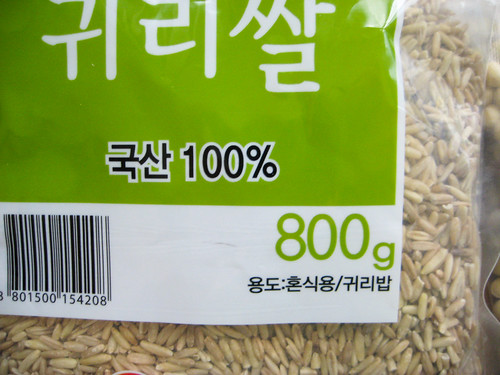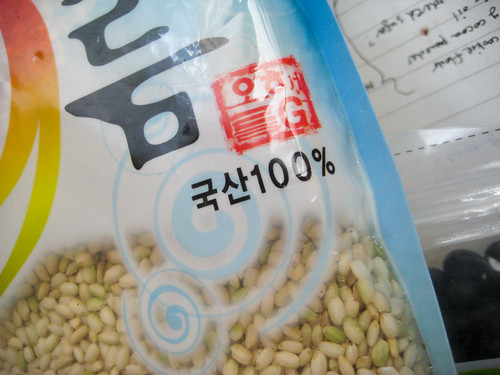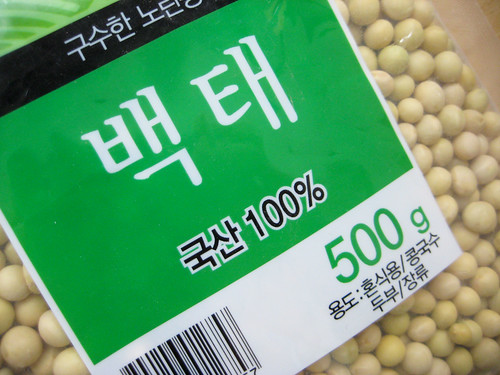#97 on my 101 List is to make a conscious effort to eat as locally as possible for one month. Well, on Feb 1st, I decided that this would be the month. Here's my list of 10 reasons why:
1. To have a smaller environmental footprint.
2. To eat fresher foods at their nutritional peak.
3. To eat more seasonally.
4. To support the local economy.
5. To enjoy local food more.
6. To discover new local foods.
7. To appreciate imported/"exotic" food more.
8. To save some money (only applies to some things).
9. To be more aware of the globalization of food systems.
10. Just for the sake of being challenged. :)
It seems that everyone has a different idea of what "local" means to them. For some, it means only foods grown within a specific mile radius. For others, it means whatever they find at their local farmer's market. For me and for the sake of this month-long challenge, "local" will mean whatever is produced or grown within this country, South Korea. The good thing about living here is that relatively speaking, it's a small piece of land (smaller than most US states), so with these parameters, food won't have to travel thaaaat far to get from the farm to my plate. Thankfully, most supermarkets clearly label the origins of foods. Even for packaged and processed items with multiple ingredients, they will usually specify where the main ingredients came from. If it says "국산" or "국내산," that means it has been grown/produced within this country. If they don't specify the country of origin, (중국산/Chinese, 미국산/USA, 호주산/Australian... ), then they usually just write "수입" which means imported.

Korea-grown oat groats (국산 100%)
So, how am I doing so far? It's only been a week, but I'm already realizing that I rely on more imported foods than I thought. The toughest part has been avoiding some favorite fruits like bananas and oranges. Even lemons. This means no banana muffins or lemon tea for me! The other day, I was at E-Mart and I literally stood in front of the huge pile of Californian navel oranges for about 3 minutes, debating in my head whether I was going to cave and buy some. "I'll just buy one... I need the vitamin C... " In the end, I didn't buy them, but it took a lot of will power! Instead, I went for a huge sack of native clementines, which are in abundance right now. At least there are plenty of other delicious Korea-grown fruits for me to choose from, such as pears, apples, and hard persimmons. I'm also taking comfort in the fact that I'm only doing this for a month, and a short month at that, haha. Hm, I wonder if I'll go orange-crazy once this challenge is up.

Korea-grown brown rice
Another toughie so far has been not buying certain processed foods where the main ingredients are imported, such as tofu or soy milk made with beans imported from China. Buying Korean-soy tofu isn't so hard, but Korean-soy milk is much more rare. Most of the soy milks out there use soy beans from China, so I haven't bought soy milk for a while... . But the other day I made my own with Korean soy beans! WOot! It wasn't too difficult, so I'll probably do that for the rest of this month. It's nice to have something to add to my morning tea. :) If this gets too annoying though, I might cave and just buy some soy milk, hehe.

Korea-grown soy beans
This isn't to say that I'm not eating any imported foods at all- I still have a ton of things in my pantry that are from overseas (like nuts, chia seeds, oatmeal), which I will continue to eat for now. I'm just not going to buy any new non-local produce. I know that's cheating a little bit, but hey, this is my own challenge and I'll make my own rules! :) Obviously, things would be infinitely harder if I did this for longer than one month and my current stash of chocolate, coffee, and black tea ran out. Now that would be a serious challenge.
So waddya think? Anyone else trying to eat more locally?